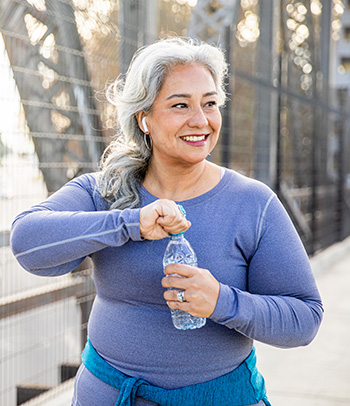Taking regular trips to the health care provider and the dentist are common steps many of us take to manage our health, but what about taking care of your eyes? What steps do you take to protect your eyes and keep your vision strong?
You can protect yourself from vision loss, stay on top of eye diseases and spot many other health conditions just by visiting an eye care professional and taking regular care of your eyes.
 Why Is Eye Health Important?
Why Is Eye Health Important?
Taking your eye health seriously is important for many reasons. Many people need vision correction, meaning glasses or contacts, to see better, but that’s not all. Regular eye exams are important for other reasons too.
- Regular eye exams can prevent some common eye diseases from causing permanent vision loss. Many eye problems begin before symptoms appear, so early treatment is important.
- Eye conditions are easier to treat when spotted early. Cataracts, diabetic retinopathy, glaucoma and age-related macular degeneration are some of the leading causes of vision loss and blindness in American adults, which is why early treatment is critical.
- In an eye exam, providers can spot other health conditions, such as high cholesterol, high blood pressure, diabetes, liver disease, various blood diseases and more.
When Should I Start Regular Eye Exams?
You can protect yourself from vision loss, stay on top of eye diseases and spot many other health conditions just by visiting an eye care professional regularly.
Your age, race and overall health play a role in how often you need to get your eyes examined. Certain people are more at risk for vision problems and certain eye diseases, including:
- People with diabetes
- African Americans 40 years and older
- All adults older than 60 years, especially Mexican Americans
- People with a family history of glaucoma
- People who are overweight or obese
You can speak to your health care provider to find out how often you should get an eye exam and at what age. For example, if you are African American, you are at higher risk of glaucoma and need to start exams earlier. If you have diabetes, you should get an exam every year.
How Can I Keep My Eyes Healthy?
 There are many ways to keep your eyes healthy and your vision strong. Here are some tips to consider:
There are many ways to keep your eyes healthy and your vision strong. Here are some tips to consider:
- Know your family history and risk factors. Some eye diseases are inherited, so ask your family members about their eye health.
- Get routine eye exams and vision screenings. Talk to your health care provider about any other risk factors you may have, including your age, race and certain medical conditions. Make a plan for keeping your eyes healthy.
- Ask for a dilated eye exam. Eye diseases are easier to treat if checked early on.
- Eat a healthy, balanced diet. Fruits, vegetables and fish, such as salmon and tuna, can help your vision and overall eye health.
- Keep your body moving. Regular exercise can help prevent obesity, diabetes, high blood pressure and high cholesterol, all of which put you at higher risk for getting diabetic retinopathy, glaucoma and other vision problems.
- Wear sunglasses to avoid damaging your eyes. Choose sunglasses that block UV-A and UV-B rays, which can raise your risk of cataracts and age-related macular degeneration.
- Wear protective eyewear. Certain factory jobs, construction work and sports activities may cause eye injuries. Protect yourself with safety glasses or goggles.
- Give your eyes enough rest. If you spend a lot of time looking at your phone or working from a computer, you can tire your eyes and dry them out. To reduce eye strain, experts suggest looking up every 20 minutes for at least 20 seconds at something about 20 feet away.
What Eye Care Resources Are Available to Veterans?
The Department of Veterans Affairs (VA) offers Veterans access to benefits and resources that promote healthy eyes and vision. If you qualify for VA health care benefits, you may be able to get some or all of your vision care through VA. Routine eye exams and preventative vision testing is covered under VA health care benefits. Your VA health care provider can help you schedule an eye exam. Learn more on VA’s vision care page.
If you’re a Veteran with vision loss or who is blind, you may be able to get more advanced vision care and rehabilitation services, including vision-enhancing devices, training in new visual skills, mobility training, counseling and more. Visit VA’s blind and low vision rehabilitation services page to learn more.
If you don’t qualify for VA benefits, the National Eye Institute offers information and resources on free and low cost vision care. Do not let the cost of eye care prevent you from taking care of your health.
Treat your eyes with the same care as the rest of your body. Routine checkups and eye care can help ensure you see better and stay healthier in the years to come.







